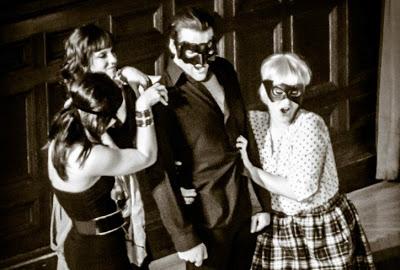by Paul J. Pelkonen

Cosí monsters: Ariana Chris, Mary Elizabeth Mackenzie, Glen Seven Allen
and Marcy Richardson in Jonathan Dawe's Cosí Faran Tutti. Photo by Joel Graham.
Così Faran Tutti (the title translate as "They'll All Do It") is that prequel. Jonathan Dawe's new work, which had its world premiere at Columbia University's Casa Italia this last week, is a bold experiment. Mr. Dawe revisits the lovers from Così fan tutte, exploring their convoluted early relationships in a funny, ribald, and thoroughly modern way that might have amused their creator Lorenzo Da Ponte.
Fiordiligi chases Despina and winds up in bed with her at the end of Act I. Ferrando kisses Gugliemo in a "Turkish kissing game" at the end of Act I. He carries a torch for his fellow soldier for the rest of the opera. The two sisters stage a masquerade ball, disguising themselves as each other (one's a schoolgirl, one's a goth) and seducing the soldiers. Eventually, the whole cast winds up in bed together, before pairing off into the familiar couples from the Mozart work.
Mr. Dawe's two-act, Italian libretto is set to a fizzing, innovative score. Heuses the Mozart original as a jumping-off point and a constant reference without descending into parody. At first, the effect of 18th century classicism through the refracted lens of a modern composer is jarring. But as the comedy spins forth the ear adjusts and this new Cosi becomes a rewarding work.
The arias and comic ensembles present serious, though manageable challenges to the small, talented cast. As Ferrando, Glen Seven Allen combined a pleasing tenor with good comic instincts, making the character's pursuit of his comrade in arms one of the opera's most entertaining (and heartbreaking) twists. Timothy McDevitt had a lesser role as Gugliemo, but made important contributions to the ensembles. Sopranos Marcy Richardson (Fiordiligi) and Ariana Chris (Dorabella) brought the two sisters to life with wit and skill--it was a pleasure to see them turn the tables on the suitors in the second act.
Despina (Mary Elizabeth Mackenzie) has less comic business in this story, acting more as an active love interest than a manipulator of events. That role is left to Don Alfonso (baritone Chad Sloan) whose coordination of the frenzied Act I finale was a comic highlight. The Don's Act II entrance (in drag as Fiordiligi) took that wily old philosopher to new (and welcome) levels of comic depravity. Both singers gave strong performances, supported by three dancers from the baroque dance ensemble Company XIV.
The choice of theater is no accident. Lorenzo Da Ponte fled his European creditors in 1805, arriving in New York City. There, he eventually became the first professor of Italian literature at Columbia College. While here, he brought opera to New York, mounting his own Don Giovanni in 1825. He went on to found the short-lived New York Opera Company in 1833, the city's first.
Director Alastair Boag staged the piece in the long, gallery-like theater of the Casa Italia. Turning the chairs sideways allowed the actors to move freely through the length of the room. Minimal sets and clever costumes in an Italian renaissance style kept the action moving swiftly. Ryan McAdams conducted the Orchestra of the Second Instrumental Unit with a deft, Mozartean touch.

